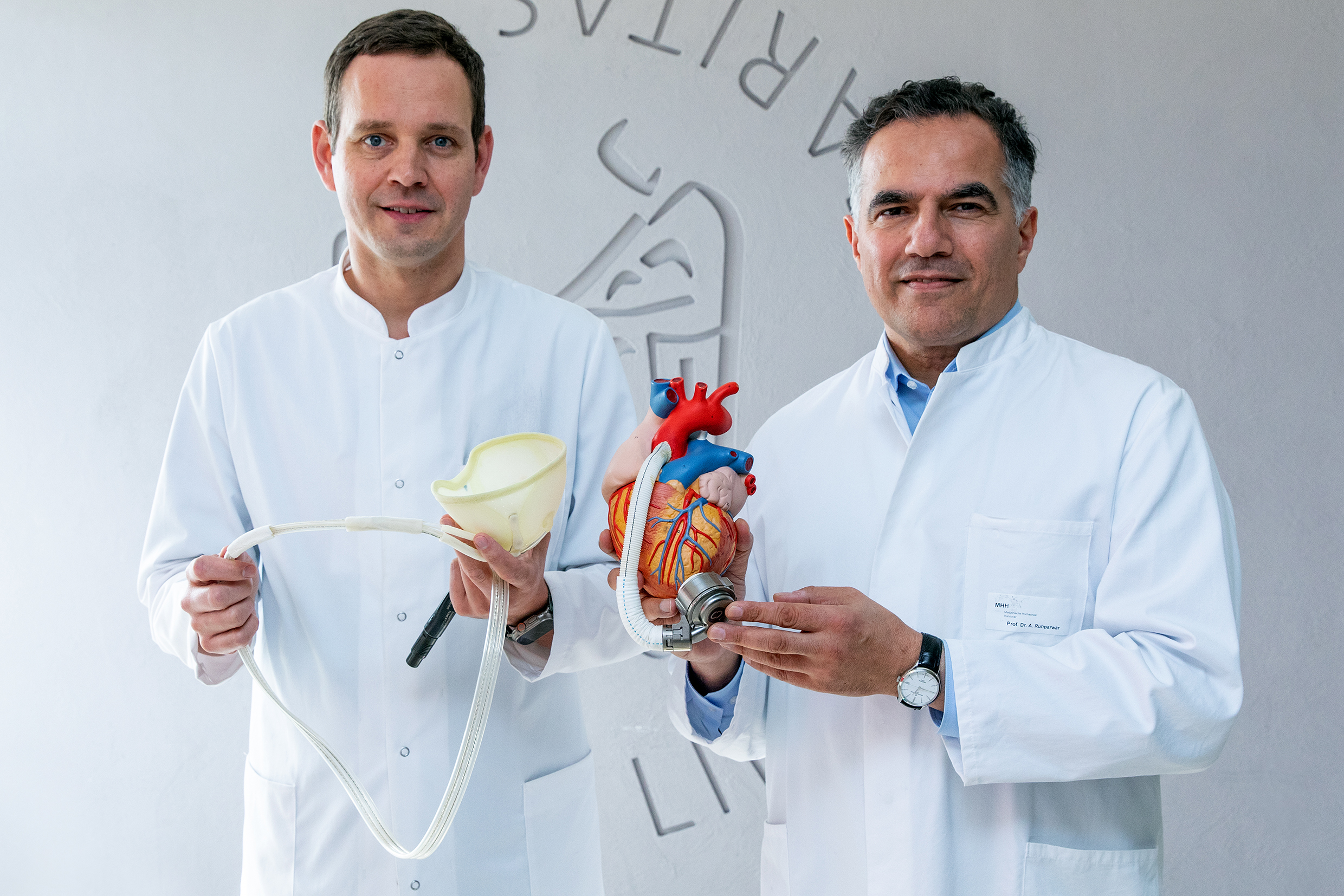World premiere: New system that is gentler on patients preserves the pulse beat.

Dr Schmack (left) is holding the plastic bag of the reBEAT system in his hand, while Professor Ruhparwar (right) shows a heart model with an implanted conventional left ventricular assist device. Copyright: Karin Kaiser / MHH
A new system that offers a gentler way of providing mechanical cardiac support for patients have been temporarily implanted in the cardiac surgery clinics of #Hannover Medical School (MHH) and the Freeman Hospital in #Newcastle upon Tyne (UK). This novel, groundbreaking circulatory support system has been successfully implanted for the first time world-wide in five patients suffering from advanced heart failure. The cardiac support technology, called reBEAT, is a new development by the Munich-based start-up company AdjuCor GmbH. It consists of an extremely thin plastic sleeve, individually manufactured for each heart size, which is slipped over the heart muscle from below. The sleeve is separated into three air chambers that can expand rhythmically, exerting pressure from the outside on the weakened heart muscle. "This is a kind of gentle, permanent cardiac massage," explains Professor Dr. Arjang Ruhparwar, Director of the Clinic for Cardiac, Thoracic, Transplantation and Vascular Surgery, who, together with his team, has used this system in Hanover for the first time, worldwide. The compressed air required for operation is supplied by a portable controller, located outside the body that weighs about 1.5 kilograms.
Many advantages: Pulse remains intact with lower risk of thrombosis and bleeding
The advantages of reBEAT over the left ventricular assist devices (also called artificial hearts) used so far – which is essentially a mechanical blood pump – currently used blood pumps have to be surgically inserted into the left ventricle - and are therefore very invasive. "While patients with the previous systems no longer have a pulse because of the continuously running pumps, the pulsatility is maintained with this new device," explains Professor Arjang Ruhparwar, "moreover, it does not come into contact with the patient's blood. Patients don't have to take medication to thin their blood, the risk of thrombosis is reduced, and the function of the blood components is preserved." Another advantage: while the mechanical pumps can only be inserted into the left ventricle, reBEAT supports both ventricles from the outside. "For those affected, this means that their heart continues to beat, but the system significantly supports this function."
A simple and safe procedure
Regulatory authorities in Germany and the UK had required the clinical feasibility study, in which surgeons have to prove that the new system can be used safely as well as take up the intended function. To do this, patients who receive a conventional left ventricular assist device are implanted with the new system for 45 minutes beforehand during the operation. The team from Great Britain led by Professor Stephan Schueler also came to Hanover for the first operation of this kind worldwide. In the meantime, reBEAT has been tested five times on humans. "There have been no complications, the system has worked excellently and all patients are doing well," says PD Dr Bastian Schmack, head of the study from the MHH. He is convinced of the simplicity and safety of the procedure. "We see reBEAT as currently the most natural form of mechanical cardiac support. We no longer have to implant anything into the heart muscle, but pull the high-tech bag over the heart like a second skin." The plan is to later use the new system in a minimally invasive way. "For the patients, the procedure is much gentler and will in all likelihood lead to significantly shorter recovery times. In addition, we can also use this system to treat patients for whom a classic left ventricular assist device is not an option for certain reasons."
Permanent use from 2025?
Professor Stephen Wildhirt, CEO of the manufacturing company AdjuCor, is proud of the collaboration with MHH and Newcastle. He emphasised the pivotal role of the the data in optimizing the device further and extending its benefits to a broader patient population. The study is not yet completed, and further patients are to be included. The MHH surgeons expect the system to be in permanent use for the first time, presumably in early 2025. "We have been researching heart support systems at the MHH for more than ten years," emphasises Professor Ruhparwar In his working group at the Lower Saxony Centre for Biomedical Engineering, Implant Research and Development (NIFE) right next to the MHH campus, they are already thinking one step ahead. "There we are researching the replacement of pneumatic contraction with electrical contraction.
Author: Stefan Zorn